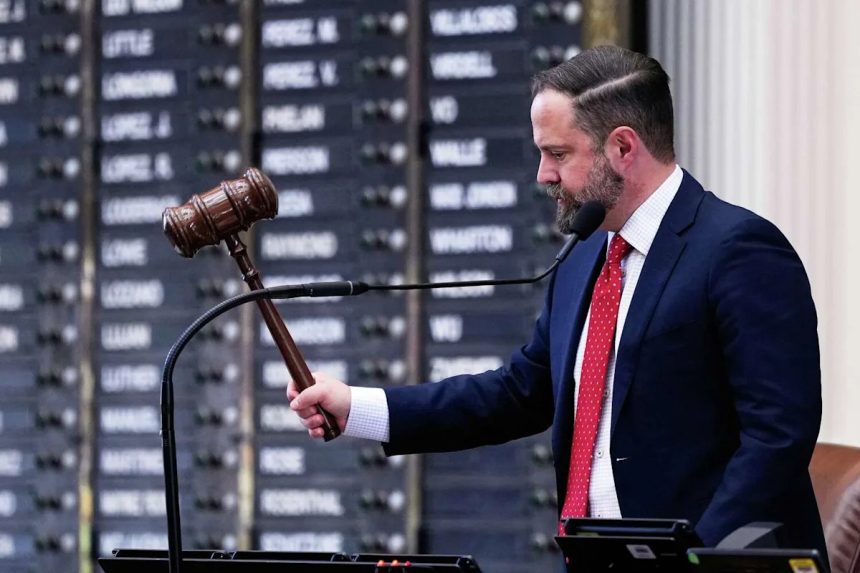The Texas Republican Party’s governing body on Saturday backed down from its threat to bar nearly a half dozen lawmakers from next year’s GOP primary ballot, ending an intraparty stalemate that would have led the organization into a costly legal battle.
The State Republican Executive Committee opted to censure three incumbents who are seeking reelection and two retiring members. The censure resolutions formally discourage each member from running again as Republicans and authorize the Texas GOP to spend general funds to oppose them in the 2026 GOP primary.
But the governing board didn’t follow through on its proposed nuclear option of stripping the censured lawmakers from the upcoming primary ballot. And five other censure resolutions failed to gather enough support, including one against current House Speaker Dustin Burrows.
READ MORE: ‘Very dangerous:’ Texas GOP looks to kick Republican lawmakers off the ballot
Burrows oversaw one of the most conservative legislative sessions in years this spring, helping push through bills establishing a private school voucher program, requiring the Ten Commandments to be displayed in public schools and barring transgender individuals from using bathrooms that align with their gender identity in government buildings after years of failed efforts.
“Last session, under the last speaker, we had six (of our priority) bills passed and they impeached our attorney general,” Texas GOP Chair Abraham George said Saturday. “This session, we had 43 bills passed and an additional five Congressional seats. So there’s a drastic difference.”
Each censure required a three-fifths vote from the 64-member body, which is elected by attendees of biennial Texas GOP conventions. Many of the resolutions criticized members for voting with Democrats to elect Burrows as speaker, signaling the party is still fuming over the episode, even as Burrows went on to oversee the most conservative session in years. The SREC had lobbied against Burrows’ speakership.
Burrows “worked very hard for the Democrats this session,” Paul Anthony Hale, a committee member, said. “He stole our agenda from us.”
“He’s at least making an effort,” responded Harris County committee member Rolando Garcia. “So since he’s presumably still going to be speaker next term, let’s preserve this relationship.”
Other resolutions dinged members for votes on bills relating to social issues and property taxes. One penalized Rep. Gary VanDeaver of New Boston, who chairs the Public Health committee, for not advancing a bill that would have required the labeling of products derived from aborted fetal tissue. Several listed members’ votes for what they called a “bloated” state budget and a bill that requires AI-generated political memes and deepfakes to be labeled as such.
Party rules allow for censures if members violate the party’s core principles or neglect the 10 legislative priorities approved by convention delegates on three separate occasions. The other four lawmakers who were censured were Reps. Angelia Orr of Waco, Jared Patterson of Frisco, Stan Lambert of Abilene and Dade Phelan of Beaumont. Lambert and Phelan aren’t running for reelection
Though the state party requested their presence, none of the censured Texas House representatives appeared at the meeting on Saturday, which was held the day of the widely popular football game between Oklahoma University and the University of Texas.
Participants in the daylong meeting alternated between airing small grievances and debating procedural rules. In one exchange, committee member David Wylie said Patterson is “the one we would censure because we just don’t like him.”
“We all know Jared Patterson is the biggest asshole in the Texas House,” Garcia shot back. “However, that is not a censurable violation.” George then said he agreed with “Rolando’s language.”
More than 75% of likely Republican Primary voters approve of Republican state lawmakers in Texas, a statewide survey of over 1,000 voters from Hunt Research shows. The survey was released Saturday morning.
Choosing its battles
The daylong formal meeting was the first test of a new penalty that allows the party to block censured lawmakers from running as Republicans in primary elections. The rule, approved in June 2024, conflicts with state law and would be unlikely to withstand inevitable legal challenges, a Waco law firm wrote in a legal opinion in January. Megadonor Alex Fairly told the Texas Tribune he would fund lawsuits against the party if representatives were removed from the GOP ballot.
In a letter to George on Oct. 3, seven of the ten lawmakers eligible for censure called the penalty “unconstitutional” and said they were “political weapons wielded by rivals seeking to eliminate competition through procedural manipulation rather than democratic debate.”
Others warned privately on Saturday that the Trump administration was not in favor of the ballot penalty. George told members that Trump officials “have their opinion about it, and they’ve very strongly expressed it.”
Adopting the penalty “would torch our relationship with the White House,” Garcia argued. “We need to send a message to activists that (the penalty) is not a toy, it’s not a game, it’s not a political strategy.”
The meeting comes as the state GOP is seeking to raise its profile and influence in elections, arguing lawmakers aren’t conservative enough after a session that saw a number of items crossed off of the activist wing’s wish list. Many State Republican Executive Committee members signaled they feel the Republican-led state Legislature is not listening to grassroots voters.
While the organization didn’t pursue ballot removal, it recently sued the Secretary of State in a bid to permit only registered Republicans to vote in its primary.
Texas Attorney General Ken Paxton, who is challenging U.S. Sen. John Cornyn in the 2026 Republican primary, declined to defend the state against the lawsuit on Thursday. Secretary of State Jane Nelson told the judge she’ll fight Paxton’s motion urging a court to strike down the law.
George on Saturday cited that lawsuit as the party’s “main fight” and said he was committed to spending millions of dollars to win it.
This article originally published at Texas GOP abandons effort to kick 10 Republican lawmakers off primary ballot.









